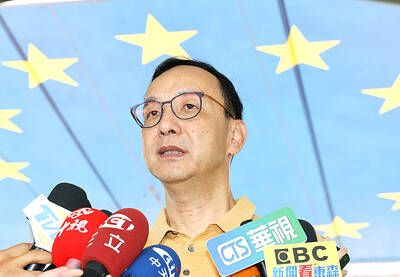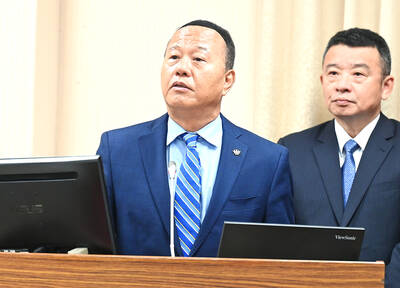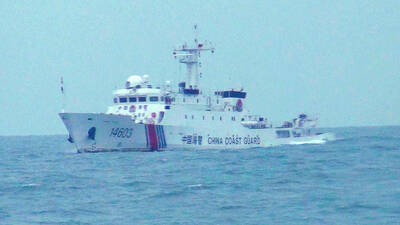The large number of media reports on public figures' infidelities has the public questioning the impact of sex scandals on politicians' careers.
According to a survey by the TVBS poll center on Aug. 12, 61 percent of people believe that a politician's personal life should be a model for the public, and only 28 percent think that it is no one else's business.
However, people were divided on whether it is more important for a politician to manage his marriage well or do his job well.
Forty-five percent percent of those surveyed thought that it doesn't matter whether a politician has a happy marriage, saying it is more important that he performs his job well. Still, 44 percent disagreed with that statement.
The results help explain why involvement in an extra-marital affair has become a moral stigma leaving politicians open to attacks from rivals and why allegations of sex scandals crop up during election campaigns.
Chin Heng-wei (金恆煒), editor in chief of Contemporary Monthly, has attributed the phenomenon to the profound influence of traditional Confucianism, which sets a high moral standard for politicians, on Chinese people.
"No matter how much liberal thought has been introduced to this modern society, some deep-rooted traditional values continue to exist. It is this latent cultural factor that makes negative publicity related to sex so forceful in election campaigns," Chin once said at a discussion on the topic held by the Taiwan Media Watch Foundation (
This has been proven in the case of many politicians, the most recent being Yao Chia-wen (
One woman threatened to disclose evidence of Yao's infidelity, which she claimed was sufficient to "unseat another DPP chairman and threaten Yao's Examination Yuan presidency."
In Yao's case, the allegations did not appear to sidetrack his campaign, however, because no evidence or witness came out.
Still, in an attempt to put the charges behind him, Yao and his wife, DPP Legislator Chou Ching-yu (
During appearances at the legislature, Yao would hold Chou's hand and he once told his wife "I love you" during a legislative session to review his nomination.
While such allegations appear potentially damaging, involvement in a sex scandal does not necessarily lead to political defeat.
This is clearly demonstrated by the fact that many legislators were elected, though they are known to be unfaithful to their wives. In particular, their infidelity seems tolerable to their constituents as long as they keep their families intact and their wives express no objection.
For example, DPP Legislator Cheng Yu-chen (鄭余鎮), who made headlines last month for eloping to the US with his aide Sophie Wang (王筱嬋), has faced numerous allegations of affairs during his 30 years of marriage to Lu Pei-yin (呂珮茵) and even has an illegitimate daughter.
Well aware of the situation, Cheng's constituents in Hsinchuang, Taipei County, still threw their support behind him until he announced his decision to divorce his wife to marry Wang. Former supporters said Cheng "has been dismissed" for the "ungrateful" manner with which he treated Lu.
An older case involves former premier Chang Chun-hsiung (
Ker Chien-ming (
Politicians involved in sex scandals usually have little problem surviving multi-seat elections such as those for the legislature, in which they only need to appeal to a small group of loyal voters. However they may feel the impact of such a scandal in a presidential or mayoral race.
In these single-seat elections, candidates usually need to attract neutral voters who have no specific political affiliation and tend to make a last-minute decision as to which candidate to support.
As shown in a Power News poll in February 2000 -- one month before the presidential poll -- 24 percent of the people had not decided on which presidential candidate to vote for. For these people, a main criterion for them was the candidate's character, according to the survey.
Luo Wen-jia (
"The target of campaign publicity is not those whose support you already have nor those who will never support you. In other words, the scope may be narrowed to the median voters," Luo said.
A victim of this kind of negative publicity is former Kaohsiung mayor Wu Den-yih (
Wu believes that allegations of his having an affair were one of the many factors responsible for his defeat. The allegations were backed up by a taped conversation between Wu and the alleged mistress, which the Kaohsiung District Court later determined determined to have been faked.
"Justice has been upheld, though it is delayed," Wu said.

GOOD DIPLOMACY: The KMT has maintained close contact with representative offices in Taiwan and had extended an invitation to Russia as well, the KMT said The Chinese Nationalist Party (KMT) would “appropriately handle” the fallout from an invitation it had extended to Russia’s representative to Taipei to attend its international banquet last month, KMT Chairman Eric Chu (朱立倫) said yesterday. US and EU representatives in Taiwan boycotted the event, and only later agreed to attend after the KMT rescinded its invitation to the Russian representative. The KMT has maintained long-term close contact with all representative offices and embassies in Taiwan, and had extended the invitation as a practice of good diplomacy, Chu said. “Some EU countries have expressed their opinions of Russia, and the KMT respects that,” he

An increase in Taiwanese boats using China-made automatic identification systems (AIS) could confuse coast guards patrolling waters off Taiwan’s southwest coast and become a loophole in the national security system, sources familiar with the matter said yesterday. Taiwan ADIZ, a Facebook page created by enthusiasts who monitor Chinese military activities in airspace and waters off Taiwan’s southwest coast, on Saturday identified what seemed to be a Chinese cargo container ship near Penghu County. The Coast Guard Administration went to the location after receiving the tip and found that it was a Taiwanese yacht, which had a Chinese AIS installed. Similar instances had also

VIGILANCE: The military is paying close attention to actions that might damage peace and stability in the region, the deputy minister of national defense said The People’s Republic of China (PRC) might consider initiating a hack on Taiwanese networks on May 20, the day of the inauguration ceremony of president-elect William Lai (賴清德), sources familiar with cross-strait issues said. While US Secretary of State Anthony Blinken’s statement of the US expectation “that all sides will conduct themselves with restraint and prudence in the period ahead” would prevent military actions by China, Beijing could still try to sabotage Taiwan’s inauguration ceremony, the source said. China might gain access to the video screens outside of the Presidential Office Building and display embarrassing messages from Beijing, such as congratulating Lai

Four China Coast Guard ships briefly sailed through prohibited waters near Kinmen County, Taipei said, urging Beijing to stop actions that endanger navigation safety. The Chinese ships entered waters south of Kinmen, 5km from the Chinese city of Xiamen, at about 3:30pm on Monday, the Coast Guard Administration said in a statement later the same day. The ships “sailed out of our prohibited and restricted waters” about an hour later, the agency said, urging Beijing to immediately stop “behavior that endangers navigation safety.” Ministry of National Defense spokesman Sun Li-fang (孫立方) yesterday told reporters that Taiwan would boost support to the Coast Guard